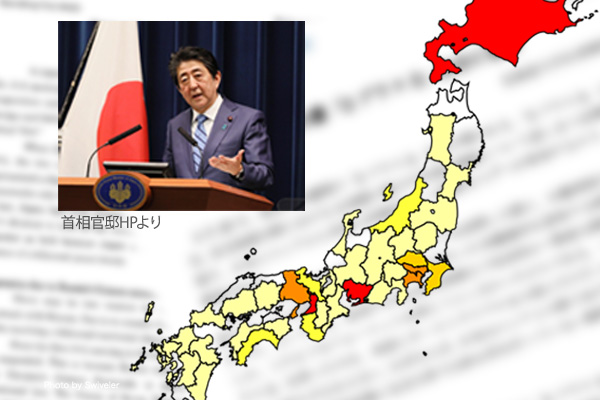Japan has revised the Act on Special Measures against New Influenza to prevent the novel coronavirus pandemic from expanding further.
Parliamentary deliberations on the revision focused on the prime minister’s declaration of national emergency. The revised act requires the prime minister to seek recommendations from an advisory panel of experts before such declaration. A supplementary resolution was passed to require the prime minister to report such declaration to the parliament in advance. We can understand the notion that imposing limitation on private rights should be careful. However, we must pay more attention to what specific measures prefectural governors would take in response to the national emergency declaration.
Leaders’ mastery seen in emergency
Amid the current coronavirus pandemic, the Hokkaido governor requested a school shutdown and a voluntary ban on leaving home before the central government did so. The revised act gives a legal basis to such requests to avoid the risk of litigation by those who suffer losses due to a voluntary restraint of events and the like. What is important is that prefectural governors’ crisis-management skills would be tested.
The Wakayama Prefecture government has conducted thorough follow-up checks on patients infected with the coronavirus at a private hospital, allowing the hospital to quickly resume operations. Some local governments have published the names of cluster infection sources for follow-up checks, but others have hesitated to do so. In a bid to avoid any healthcare collapse, the Osaka Prefecture government has adopted its own policy of asking people with mild symptoms to remain at home without being hospitalized. On the other hand, some local governments have followed the national policy of hospitalizing even those with mild symptoms and come to the brink of hospital bed shortages.
During an emergency full of uncertainties rather than a peacetime situation, we can clearly see successful or unsuccessful decision-makings by leaders.
Each region should be prepared for crises
A dynamic graph of coronavirus infection has been repeatedly reported for the whole of Japan. To avoid any healthcare collapse, however, prefectural governments should develop their respective graphs and scenarios.
Measures to minimize regional social and economic damage and maximize effects of infection expansion prevention naturally differ by region. Regional experts, medical societies, business associations and central government offices should form forums to discuss specific options and priority orders in preparation for crises. Existing action plans should be quickly revised to meet the characteristics of the novel coronavirus. Prefectural governors are required to make quick, transparent crisis-management decisions. Public relations arrangements for explanations to local residents are also important.
Cross-prefecture cooperation is required in addition to each prefecture’s efforts. Amid the current crisis, Osaka Prefecture makes up for weak points of the coronavirus testing system in neighboring Wakayama Prefecture.
The abovementioned measures should be prepared before an emergency declaration. Prefectural governors who have called for decentralization, now must demonstrate their respective ability. The revised act is testing local government competence.
Masahiko Hosokawa is a special professor at Chubu University and a former director-general of the Trade Control Department at Japan’s Ministry of Economy, Trade and Industry. He is also a Planning Committee member at the Japan Institute for National Fundamentals.


